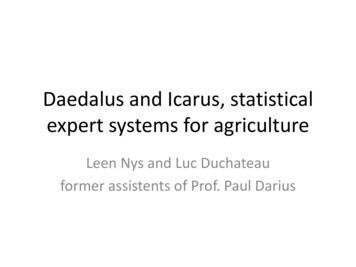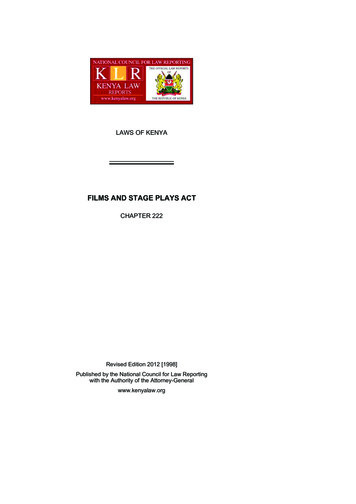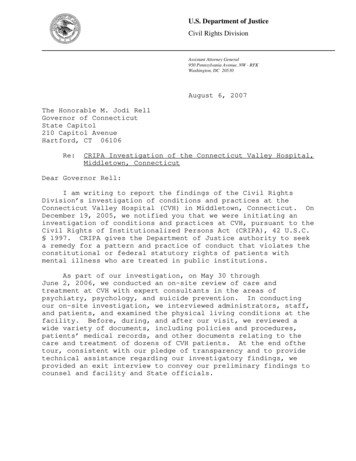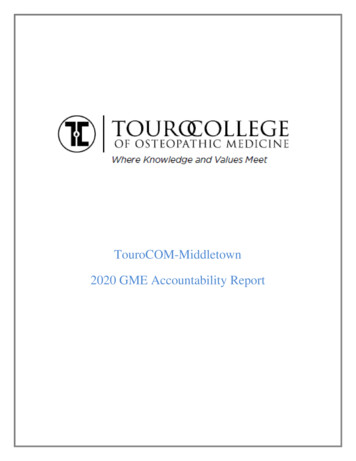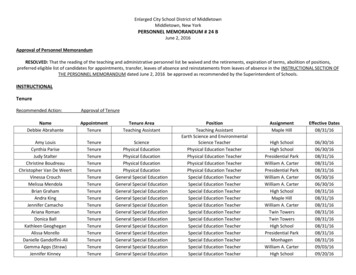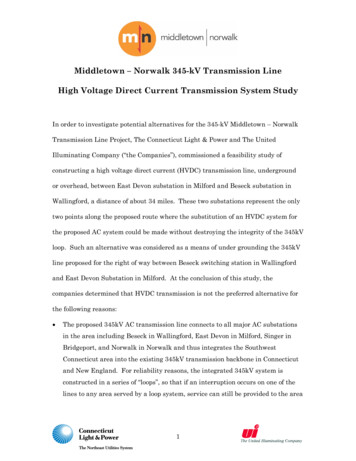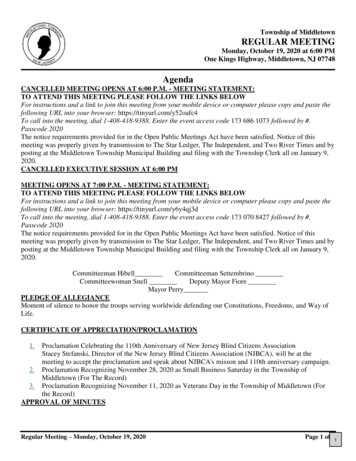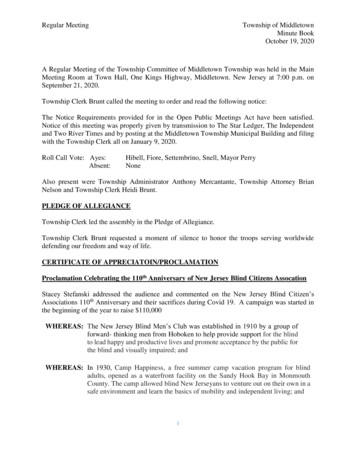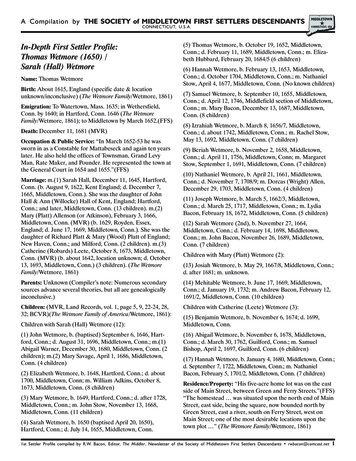
Transcription
MIDDLETOWNA six-part film seriesCreated & produced by Academy Award and Emmy-winner Peter DavisThe Campaign - Directed by Tom CohenThe Big Game - Directed by E.J. VaughnCommunity of Praise - Directed by Richard Leacock & Marisa SilverFamily Business - Directed by Tom CohenSecond Time Around - Directed by Peter DavisSeventeen - Directed by Joel DeMott & Jeff KreinesColor, 457 minutes, U.S., 1982 UPC # 8545650012444 Discs / 16-page booklet / SRP: 44.98 a bonus filmed interview with Peter DavisPre-Book Date: Aug. 17, 2010Street Date: Sept. 21, 2010Press Contact:Icarus FilmsSylvia SavadjianSylvia@icarusfilms.com718.488.8900For stills and to download the press l
Short Synopsis:Created and produced by the Academy Award-winning Peter Davis (HEARTSAND MINDS), this Emmy-winning six-part film series documents middle-classlife, American values and customs in “Middletown”- a.k.a. Muncie, Indiana.Inspired by immensely influential Depression-era sociological studies by Robertand Helen Lynd - Middletown: A Study in Modern American Culture (1929) andMiddletown in Transition: A Study in Cultural Conflicts (1937) - this series of filmsmade for PBS in 1982 transforms the Middletown studies into an unprecedentedoverview of American life seen through the prisms of local politics, high schoolsports, a family business, religion, marriage and divorce, and (at the time stillexplosively) interracial dating.Producer’s Statement:MIDDLETOWN was intended to search for continuity and change in American lifeas embodied in the people, institutions and core values of a single community. Iwanted to produce films that located vital American processes in their culturalcontexts. In this effort I was inspired by the pioneering work of culturalanthropology done in the 1920s by Robert and Helen Merrell Lynd in Muncie,Indiana. They looked at Muncie, which was referred to as Middletown, the wayMargaret Mead looked at Samoa or Claude Levi-Strauss at the Amazonrainforest. Although the design is grand, Middletown’s form is simple andpurposeful, propelled by character, conflict and action.This is neither a survey nor a slice-of-life series of films; it is instead a non-fictionexploration of critical events in the lives of our subjects. We were dealing withordinary Americans at extraordinary moments, at turning points. Each film is anindividual entity, yet each contributes to the comprehensive structure of theseries as a humanist inquiry into American life. MIDDLETOWN is not only aseries of films but also, I hoped then and continue to hope, a mirror in which we,as Americans, might see our own reflection.-MIDDLETOWN creator and producer, Peter Davis,2010
THE CAMPAIGNDirected by Tom CohenEmmy winner for Best SoundFocusing on Muncie‟s mayoral race, THE CAMPAIGN follows closely the personalities,strategies, and pressures involved in an American political contest. In particular, itexamines the sharply contrasting styles and backgrounds of the Democratic andRepublican candidates."The achievement of THE CAMPAIGN is that these vignettes are both believablyspecific and broadly symbolic. It's a classic slice of Americana." -Atlanta Constitution"This is politics as real life. Proof of the film-ready narrative structure of a campaign: lifeor death drama, where one candidate will win, one will fail; without presidentialcandidates or national celebrities, just everyday characters reaching out for the votes oftheir neighbors, the people they knew--and who knew them. Unforgettable."-Paul Stekler, International DocumentaryCredits:Created and Produced by .Peter DavisDirected by . . Tom CohenPhotographed by . .John LindleyFilm Editor . Bob BradyProduction Manager . Craig PerryUnit Manager, Location Coordinator . Terry SimonResearch Consultants . Dwight Hoover, Joseph Trimmer, Warren Vander HillSound . Tom CohenAdditional Photography Paul Goldsmith, Kevin Keating,Vic Losick, Ed Marritz, Jim Coyne, John Gunselman, Tom McDonoughAdditional Sound Danny Michael, Francis Daniel,Philip Pearle, Tony Buba, Don Regensburger, Paul Glicksberg, Bud BennettAssistant Editor .Emily PaineSound Editor . Marc CeruttiAssistant Editors Martha Jeroaman Goode, Jean Standish, Marshall GruppFirst Assistant Cameraman David EubankAssistant Cameraman. Ed Marritz, Sean Drury, Philip Holahan, Gabe Kover, Ken Knight
Additional Unit Managers . Jackie Leopold, Paul GlicksbergGaffers Steve Silverman, Pat TroyonProduction Assistant . Rob GoubeauxProduction Secretary . Susan J. BaumCellist . Janos StarkerPianist . Anthony Davis
COMMUNITY OF PRAISEDirected by Richard Leacock and Marisa SilverCOMMUNITY OF PRAISE examines faith in the lives of a family whose fundamentalistbeliefs are revealed in how they deal with both the emergencies and the ordinaryproblems and strife of daily life.Credits:Created and Produced by . Peter DavisDirected, Photographed, Edited by . .Richard Leacock & Marisa SilverAssistant Editor . Emily PaineProduction Manager . Craig PerryProduction Secretary . Susan J. BaumResearch Consultants . Dwight Hoover, Joseph Trimmer, Warren Vander HillCellist . Janos StarkerSound Editor . Bonnie KozekApprentice Sound Editor . Terry ShandsAssistant Sound Editor . John Murray
THE BIG GAMEDirected by E.J. VaughnCo-Directed by Ruth NeuwaldAs the basketball teams of Muncie Central and Anderson High prepare to meet in anannual game charged with the spirit of long-established rivalry, THE BIG GAMEexamines what this competition and what the sport itself means to the community, thecoaches, and most of all to the players themselves."The best scene is not when Morgan goes one on one with Rowray. It's when Morgangoes one-on-one with his guidance counselor. If this powerful segment ofMIDDLETOWN changes the life of one such high school basketball player, we shouldall stand up and cheer." -Buffalo Evening NewsCredits:Created and Executive Produced by Peter DavisProduced & Directed by . . E.J. VaughnEdited & Co-Directed by . . . . Ruth NeuwaldCreative Consultant . Charlotte ZwerinPhotographed by . . . Paul GoldsmithAssociate Producer & Associate Director . Tom SimonAssistant Producer .Ira HalberstadtProduction Manager . Craig PerryPrincipal Photography . Paul Goldsmith, Mark BenjaminPrincipal Sound . Ron Yoshida, Phil GleasonLocation Sound Mixer . John HamptonAdditional Photography Tom McDonough, Barry Rebo, Michael HallAdditional Sound .Danny Michael, Ron HonsaVideo Engineer Barry MinnerlyVideo Recordists . Alvin Krinsky, Peter Schnall, Neil Smith, Neil SydorRecruiting Sequence . Robert Brady, Don Lenzer, Petur Hliddal, Kenneth FinkLocation Chef . Leslie McBrideSound Mixer . Vin GizziAdditional Sound Editing . B.G. Williams
Post Production Engineer . Phil FalloAssociate Editor . Herman K. TrabishAssistant Editors . Vito Brunetti, Kathy SchermerhornVideo Dubber . Steffan FinkelResearch Consultants .Warren Vander Hill, Dwight Hoover, Joseph TrimmerProduction Assistants . Jan Blackwell, Dave Webb, Mike Blackwell, Laura Wirthlin,Matthew Hanifa, Mark Yates, Jon Vander HillCellist: . Janos Starker
SECOND TIME AROUNDDirected by Peter DavisCo-Directed by John LindleyThrough focusing on the pre-wedding arrangements of David and Elaine, an engagedcouple who each had a prior marriage and divorce, SECOND TIME AROUND presents apicture of the issues and complexities of contemporary marriage.Credits:Created, Produced & Directed by . . Peter DavisPhotographed & Co-Directed by . . . John LindleyEditor Tom HanekeAssistant Editor . Richard HoworthAssociate Producer . Terry SimonSound . Larry LoewingerProduction Manager . Craig PerryAdditional Photography . Nancy Schreiber, Mark ObenhausFirst Assistant Camera . David EubankAdditional Sound . Danny Michael, Larry HoffAssistant Camera . Lisa Rinzler, Steve DrellichUnit Manager .Tom SimonGaffers .Tim Wallace, Rufus StandeferElectrician . Doug ArmstrongResearch Consultants Joseph Trimmer, Warren Vander Hill, Dwight HooverPost- Production Photography . Richard Howorth, Michael HallAssistant to the Producer Susan J. BaumProduction Assistants . Laura Wirthlin, Leon Falk, Mike Blackwell, Steve Todd,Frank Foster, Larry Craig, Bob Nonweiler, Jamey Baer, Eric HoopingarnerCellist Janos StarkerSound Mixer . Lee DichterNegative Matcher . Larry Mischel
FAMILY BUSINESSDirected by Tom CohenEmmy winner for Best EditorAlthough they differ in their attitudes toward work and its rewards, all ten members ofthe Snider family struggle to keep ex-marine Howie Snider‟s Shakey‟s Pizza Parlorfranchise from sliding into bankruptcy in FAMILY BUSINESS."Howie Snider's eight children may privately despair as they slave in his kitchen, but theynever stop enveloping him with solidarity and love. This is a story of genuine heroism."–Harry F. Waters, Newsweek"Marvelous. as close to a genuine slice of life as television can muster."-Los Angeles Times"Remarkably intimate. There are scenes that will stick with you for life."-Chicago TribuneCredits:Created and Executive Produced by Peter DavisProduced & Directed by . . Tom CohenPhotographed by . . Tom HurwitzEditor & Associate Producer . Bob BradySound . Peter MillerResearch Director/ Unit Production Manager . Terry SimonAssistant Editor Caroline EmmonsSound Editor . Bonnie KozekApprentice Editor Terry ShandsAssistant Sound Editor Janet ConnAssistant Cameraman . . David EubankGaffer . Rufus StandeferGrip Judy HoffmanBest Boy . Jim SofrankoProduction Manager: . Craig PerryProduction Assistants .Margie Waller, Michael Blackwell, Jon Vander Hill, Mark Yates
Sound Mixer . Lee DichterProduction Secretary . Susan J. BaumResearch Peter EsmondeResearch Consultants . Dwight Hoover, Joseph Trimmer, Warren Vander HillCellist . Janos Starker
SEVENTEENDirected by Joel DeMott and Jeff KreinesWinner Grand Jury Prize Documentary, 1985 Sundance Film FestivalIn their final year at Muncie‟s Southside High School, a group of seniors hurtle towardmaturity with a combination of joy, despair, and an aggravated sense of urgency. Theyare also learning a great deal, both in and out of school, that is often quite different fromwhat school officials think they are teaching.“One of the best and most scarifying reports on American life to be seen on a theaterscreen since the Maysles brothers‟ “SALESMAN” and “GIMME SHELTER.haunts thememory.” -Vincent Canby, New York Times"Truly scandalous." -J. Hoberman, The Village Voice"[SEVENTEEN has] a rare and gripping sense of gritty honesty." -Judy Stone,San Francisco Chronicle"SEVENTEEN is more frightening than 'The Day After' " -The Atlanta ConstitutionCredits:Created & Produced by . Peter DavisCo-Produced, Directed, Photographed, Recorded, Edited by Joel DeMott & . . Jeff KreinesAssistant Editor, Production Assistant . Peter EsmondeSound Mixer . Lee DichterProject Coordinator .Craig PerryProject Secretary . Susan BaumResearch Consultant . Joseph TrimmerCellist Janos Starker
About the Original Middletown Studies:In the 1920s, Robert and Helen Lynd conducted a sociological study of Muncie, Indiana,that was published in 1929 as Middletown: A Study in American Culture.The Lynds wrote that "the aim of the field of investigation recorded in the followingpages was to study the interwoven trends that are the life of a small American city." Theyexamined the following areas: "Getting a Living," "Making a Home," "Training theYoung," "Using Leisure," "Engaging in Religious Practice," and "Engaging inCommunity Activities." They admitted that "a typical city, strictly speaking, does notexist, but the city studied was selected as having many features common to a wide groupof communities."Robert Lynd updated the study in Middletown in Transition, published in 1937. Theseworks were just the beginning of a continuing series of articles, books, documentaries,and other examinations that would make Muncie-as-Middletown one of the most studiedcommunities in America. Middletown III was a research project funded by the NationalScience Foundation from 1976 to 1981, and Middletown IV was done in 1999-2000.The Center for Middletown Studies was established in 1980 to collect materials andsupport research on Muncie. It became a unit of Ball State University in 1984.MIDDLETOWN Filmmaker Biographies:TOM COHEN (The Campaign and Family Business) made several documentaries inLatin America, including Campamento about the Chilean revolution, The Healer about aPeruvian witch doctor, and Triunfo about a Peace Corps volunteer. He was associateproducer and sound man on Hearts and Minds, a film about the Vietnam War. Other filmwork has taken him from the floor of the New York Stock Exchange to the rice paddiesof Bangladesh to the muddy fields of Woodstock. He has written non-fiction as well as ascript for the PBS series, The History of the Jews in America, and he has made a videopresentation about the New Deal for the Roosevelt House in New York.PETER DAVIS (Second Time Around and Middletown Series producer) wrote HungerIn America and made The Heritage of Slavery, The Battle of East St. Louis, and TheSelling of the Pentagon for CBS News; Hearts and Minds, distributed by WarnerBrothers; The Best Hotel on Skid Row for HBO; JACK (with Nick Davis) for CBS. Hisbooks include Hometown, Where Is Nicaragua? and If You Came This Way. Amongnumerous magazine articles, he covered the war in Iraq for The Nation Magazine.JOEL DEMOTT and JEFF KREINES (Seventeen) have worked together for more thanthirty years after attending Ricky Leacock‟s MIT film lab. Jeff Kreines made an early
film, The Plaint of Steve Kreines as Recorded by His Younger Brother Jeff, and togetherDeMott and Kreines made Demon Lover Diary about Kreines‟ attempt to help a friendmake a horror movie. They have filmed the realities of working class life in Montgomery,Alabama, exploring issues of race, gender relations, class and sexuality. Jeff Kreinesdeveloped the Kinetta Camera which he introduced at the NAB Digital Cinema Summitin 2004.RICHARD LEACOCK (Community of Praise) is a legendary documentarian whosereputation is of a magnitude that many if not most younger non-fiction filmmakers claimdescent from him and his pioneering techniques in Cinema Verite. For twenty years hewas head of the Film Department at MIT. His films include his work as cinematographeron Robert Flaherty‟s Louisiana Story and on Robert Drew‟s Primary, which was also shotby Albert Maysles and edited by D. A. Pennebaker. Leacock co-directed the films AHappy Mother‟s Day with Joyce Chopra; Lambert, Hendricks & Co. with D. A.Pennebaker; A Stravinsky Portait with Rolf Lieberman, Lulu In Berlin with Susan Woll,Les Oeufs a la Coque and Les Vacances de Monsieur Leacock with Valerie Lalonde, andmany, many others.MARISA SILVER (Community of Praise) dropped out of Harvard to work onMiddletown‟s religion film with Ricky Leacock. She is a screenwriter, film director and,more recently, a noted author. Her feature films include Permanent Record, Vital Signsand He Said, She Said. Her enthusiastically praised fiction includes the short storycollection Babe In Paradise and the novels No Direction Home and The God of War.E. J. VAUGHN (The Big Game) has produced and directed the feature documentariesAmerica‟s Pop Collector about the American art market, and Deal, a behind-the-scenesstudy of the game show Let‟s Make A Deal. He has produced and directed for BillMoyers‟ Journal, contributed to NBC News‟ Today Show as well as to ABC News‟Close-Up and 20/20. He has a PhD in Communications Studies from the University ofMichigan, and he is currently developing programming that attempts to stem the tide ofhigh school and community college drop-outs.The Middletown Series would not be what it is without the work of JOHN LINDLEY,who shot both The Campaign and Second Time Around (which he also co-directed),TOM HURWITZ, who shot Family Business, and PAUL GOLDSMITH, the principalcameraman on The Big Game. This is equally true of the film editors BOB BRADY (TheCampaign and Family Business), TOM HANEKE (Second Time Around), andCHARLOTTE ZWERIN (The Big Game).Middletown‟s Research Director was TERRY SIMON, who was invaluable in makingand maintaining contacts in Muncie as well as finding several of the filmed participantsin the Series. The Production Manager was CRAIG PERRY, who was adept at movingfilm crews to their locations where and when they were needed as well as preventing theSeries from going even further over budget than it did. SUSAN BAUM was officemanager, production secretary, and if there is such a position as Morale Booster, shefilled that slot.
The Middletown Series was nominated for ten Emmies and won two – Tom Cohen forsound on The Campaign though it may as well have been for his directing, and BobBrady for editing on Family Business. The individual films have won a number of otherawards, including the Grand Jury Prize at Sundance for Seventeen.THE MIDDLETOWN FILM PROJECTBy Peter DavisLooking at the Middletown films a generation after their completion, I find itstriking – embarrassing really – that a single word not only binds but flows like a rushingstream through all six films. It is a peculiarly American word that seems to apply to us asit would not if a similar study were made in Italy, China or even among our culturalprogenitors in the British Isles. The word is wanting.Though my intention was to explore deeper issues of power, faith, fairness, socialforces, race, gender and class in Middletown, wanting turns out never to be far from thesurface in any of the films.Anyone in pursuit of trends or truths in contemporary American experience hopesto do work that is timely, of course, yet you also hope it will have a resonance that maycarry into the next generation. Though I am speaking for myself, not for the giftedfilmmakers I hired nor for the Project‟s knowledgeable academic advisors, none of usfailed to notice the encounter between continuity and change. This scrum enticed me somuch I paid insufficient attention to wanting, the tidy gerund so clearly on display in thefilms. Now anyone can see it. Icarus Films‟ decision to bring out this DVD set exposesThe Middletown Film Project to the harsh light of at least a few decades of posterity.My embarrassment is that I didn‟t see the wanting much earlier. When theacademic advisors and I formed the Middletown Film Project in 1976, my own aim wasto look at a single American community for what it could tell us about our society.Writers and observers as far apart as Alexis de Tocqueville, Saul Bellow, and Robert andHelen Merrell Lynd have looked at America and seen the wanting. “The Indian,” deTocqueville wrote, “knew how to live without wants,” while the new American man was“constantly on the move” trying to improve his lot, “and you will always find himpreoccupied with fresh plans to increase his comfort.” In Henderson The Rain King,Bellow‟s protagonist is assailed by the refrain, “I want, I want, I want,” which also hauntsthe main character in his late novel Ravelstein. The reprise is neither lazy nor accidental;it was Bellow, born a Canadian, on American yearners.Robert and Helen Lynd, with their pioneering 1929 work of culturalanthropology, Middletown: A Study In Contemporary American Culture, were theinspiration for The Middletown Film Project. Though it wasn‟t what I focused on when Ifirst read their study, a substantial amount of wanting filled the Lynds‟ Middletown.Workers wanted to improve their social and economic position; new devices for leisurelured customers; “petting parties” beckoned teenagers; the drive for social change was inhigh gear; citizens wanted to own their homes; and the accumulation of wealth was aprimary goal. Much of this wanting echoed de Tocqueville‟s observations that “in no
other country is the love of property keener or more alert than in the United States,” and“as one digs deeper in the national character of Americans, one sees that they have soughtthe value of everything in this world only in the answer to this single question: how muchmoney will it bring in?”The films then. The advance into filmmaking was made with the well-informedadvice, if not always the enthusiastic consent, of my distinguished academic colleagues:Professors Dwight Hoover, Warren Vander Hill, and Joseph Trimmer of Ball StateUniversity in Muncie, Indiana, where all the films were shot. The Project was searchingfor realities in American life as embodied in the people, institutions and core values ofone town. Although that design sounded grand, perhaps even grandiose, the films‟ formis simple and purposeful, propelled by character, conflict and action. Middletown isneither a survey nor a slice-of-life film series; it is instead a beholding – an inspection asclose as we could make it – of critical experiences in the lives of our subjects. Ordinarypeople, as the saying goes, at extraordinary moments, at turning points. Each film is anindividual entity, yet each contributes to the comprehensive structure of the series as ahumanist inquiry into American life. Middletown is not only a series of films but also, Ihoped then and still do, a mirror in which we might see our reflection.The Lynds divided their inquiry into six parts, and so does the Middletown series.In the Lynds‟ words, their categories were: getting a living; making a home, training theyoung, using leisure in various forms of play, engaging in religious practices, andengaging in community activities. The Middletown films, in the order of their scheduledbroadcast by PBS, are in the corresponding categories of politics, play, religion, work,marriage, and education. The final film, on education, ran into an institutional buzzsawfor reasons I‟ll come to presently. But it was not because the film is devoid of wanting;on the contrary, it was the forms wanting takes among high school students that provedunacceptable to those who saw themselves as sentries at the gates of respectability.The Campaign, the Project‟s politics film, directed by Tom Cohen, is about twocandidates who want to be Muncie‟s mayor. The baby-kissing Irish pol Democrat, aftertwo separate indictments while he was serving as chief of police and sheriff (he wasnever convicted but the mud sticks), wants a return to the high regard of his community.The milder, almost bland Republican wants to project an image of leadership ability thatwill make him electable. The Democrat hugs everyone within reach; the Republican,knocking on doors to ask for votes, is awkward but sincere. The contrast between the twois starkly evident when the Democrat is interviewed bare-chested while the Republicanrelaxes in an easy chair in a vest and tie. Both candidates have non-political desires whenthey have time to be human beings. The Republican tells his young son he‟d rather playwith him than campaign; the Democrat tells his mother-in-law, “I been screwing yourdaughter fifteen years and I want to keep doing it.”The Big Game, directed and produced by E. J. Vaughn, pits two high schoolteams against one another in a basketball game that defines not only character and abilitybut also helps determine the players‟ future. In basketball-mad Indiana, both teams wantto win, of course, but there are other goals as well. Star players want college scholarships.On a recruiting tour, various coaches tell the white star of Muncie‟s team how much theywant him at their colleges. What the black leader of the opposing team wants, mostly, is“my ticket out,” by which he means out of his own social background as well as his town.
But there‟s another agenda, another level of wanting: “Discipline becomes a fundamentalpart of training for an extreme contest,” one of the recruiting college coaches tells thewhite player, making it clear he means to train his players for combat.Community Of Praise, directed, filmed and edited by Richard Leacock andMarisa Silver, is about wanting salvation. “It‟s all a search for Jesus,” one evangelicalsays. A veterinarian leads a prayer meeting where he reveals personal problems amonghis brethren by saying he wants to purge “the spirit of epilepsy, alcoholism, smoking,harlotry.” While she‟s trying to be saved, the central family‟s wife and mother wants tohold on to her husband, who leaves her and drinks; the husband just wants to be allowedto express his urges, which include beating his children. A young son admits, “I haven‟tbeen willing today,” hoping he will be made willing to be saved. The veterinarian praysfor a miracle cure for a child with severe scoliosis. The family is never far fromsurrendering to anguish, keeping its hopes up through prayer and the support of theevangelical community.Family Business, directed and produced by Tom Cohen, features the ex-Marineproprietor of a Shakey‟s Pizza franchise that is in sharp, agonizing decline. With mixedelements of a carnival pitchman, Willy Loman, and Archie Bunker, the proprietor wantsto save the business and hold together his family, most of whom work for him. Forlornly,gamely, he plays the banjo and sings “Show me the way to go home” to his dwindlingcustomers. His wife weeps when the Shakeys headquarters threatens to close down thefranchise. His grown children want to help their father but also to rebel against hisauthority so they can begin to lead their own lives. “Everything I own is in hock and tiedup with this business,” the proprietor says, and adds later, referring to his loyal butdiscontent children, “They don‟t know how thin the ice is I skate on.” He‟s a dreamerwho sometimes forgets it‟s a dream and believes he can make his wishes come true. Butthen, sadly, realistically, he declares, in a querulous tone that may echo in the ears ofanyone facing foreclosure, “You know what you have to do to borrow money? You haveto prove you don‟t need it.”Second Time Around, which I directed, portrays a man and woman in theirthirties, each having endured a painful divorce, as they try to proceed toward a newmarriage. They are dreamers too, as much as the candidates for mayor, the basketballplayers, the religious fundamentalist trying to hold onto both her faith and her husband,or the Shakey‟s proprietor himself. The engaged couple look at homes they want to moveinto but can‟t afford. “Nice way to start a new life,” the man says, “in debt up to yourears.” In what they regard as a shabby neighborhood, they tour a run-down house, leakywith broken appliances, and the woman cringes. With two young sons by her firstmarriage, the woman reluctantly agrees to go to work if her fiancé won‟t insist on morechildren. They give one another baleful looks over his attempt to make a manageablebudget and her efforts to integrate him into her sons‟ lives. “What we have that‟s good isgreat,” the woman says, “but what we have that‟s not so good is terrible.” Pulling indifferent directions and worrying about money, family, and love itself, the couple‟spastoral visit is a bust; “take time to have fun,” the minister counsels to deaf ears. Whenthe planned wedding is only days away, the couple have a showdown in her apartment.She is discouraged and nervous. Both are having second thoughts. “Fifty per cent of thepeople who get married get divorced,” he says, “so what are we going to do?”
Seventeen, the final Middletown film, made by Joel DeMott and Jeff Kreines,follows students in their senior year of high school. This film fairly bleeds with want. Thegirl at the center of the film wants her freedom from adult control and from school; shewants friendships her community frowns on, and of course she and her friends want sex,drugs, and rock „n roll. They want to be grown-ups while also wanting to remain kids freeof responsibility. An interracial theme is prefigured in the opening scene when theteacher of an unruly cooking class says, “You take half a cup of white sugar and half acup of
The Big Game - Directed by E.J. Vaughn Community of Praise - Directed by Richard Leacock & Marisa Silver Family Business - Directed by Tom Cohen Second Time Around - Directed by Peter Davis Seventeen - Directed by Joel DeMott & Jeff Kreines Color, 457 minutes, U.S., 1982 UPC # 854565001244 4 Discs / 16-page booklet / SRP: 44.98


